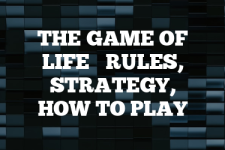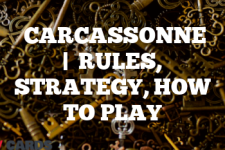Fictionary: The Ultimate Guide to Rules, Instructions & Winning Strategies
Introduction
Fictionary, also known as “The Dictionary Game,” is a popular word game that tests players’ creativity, vocabulary, and bluffing skills. The game’s objective is to create a convincing definition for an obscure word that other players will believe is the correct one. The game’s history is as fascinating as the game itself, with its origins dating back to the 19th century. It was initially played in literary circles and later gained popularity in social gatherings and parties.

To play Fictionary, all you need is a dictionary, paper, and pens for each player.
The game is unique in its requirement for creativity, humor, and deception, rather than a focus on traditional gameplay elements or strategy. In my opinion, it makes for a great and easy party game that anyone can play without the need for learning complex rules. Some suggest that the game was first created in the 19th century. However, its modern popularization is often attributed to the casual parlor games played in the Victorian era. During these times, it was common for people to gather together and participate in various word games, riddles, and charades in ‘parlor’ games.
The game Fictionary gained prominence in the 20th century, often being played at parties or social gatherings. Initially, it was played with a real dictionary, with one player choosing a word that others don’t know. The other players then come up with a convincing definition for the chosen word, and the person who chose the word selects the best definition.
In 1983, a commercial version of the game, named Balderdash, was released by a Canadian company and later, in 1993, was picked up by Mattel. Since then, it has been produced and sold in many countries around the world, with newer editions even incorporating categories beyond words, such as movies, people, and laws.
Fictionary, or Dictionary, is also often played in educational settings as a way to increase vocabulary and language skills. It encourages players to think creatively and critically about language, and promotes social interaction and fun.
Rules for playing Fictionary
- Each round begins with one player (the “picker”) selecting an obscure word from the dictionary.
- The picker writes down the correct definition on a piece of paper.
- Other players write down their made-up definitions for the word.
- The picker collects all definitions, reads them aloud, and players vote on which they believe is the correct one.
- Points are awarded based on the votes. If a player’s fake definition is chosen, they receive a point. If a player correctly identifies the real definition, they also get a point.
These are the official rules, but like many games, Fictionary can be adapted with ‘house rules’ to suit the preferences of the players.
The official rules of Fictionary can be modified with ‘house rules’ to match the players’ preferences.
How To Play
Setup
Each player needs a piece of paper and a pen. One player is chosen to be the first picker. The picker selects a dictionary and chooses an obscure word.
Gameplay
- The picker announces the word but not its definition.
- Other players write down their fake definitions.
- The picker collects all definitions, including the real one, and reads them aloud.
- Players vote on the definition they believe is correct.
End of the Game
The game ends when a predetermined point limit is reached, or after a set number of rounds. The player with the most points wins.
How to Win at Fictionary
Winning at Fictionary requires a blend of creativity, a good vocabulary, and a knack for deception. Here are some strategies that can help you win:
- Make your definition believable: The key to winning Fictionary is to create a definition that sounds plausible. Use language that mirrors the style of a dictionary definition.
- Know your opponents: If you know the other players well, you can tailor your definition to their knowledge and vocabulary level.
- Don’t always go for the complex: Sometimes, a simple and straightforward definition can be more convincing than a complex one.
Best Strategies for playing Fictionary
While winning is important, the real fun in Fictionary lies in the creative process. Here are some strategies to enhance your gameplay:
- Be creative: The more unique and imaginative your definition, the more fun the game becomes.
- Use humor: Funny definitions can often throw other players off and make the game more enjoyable.
- Learn from others: Pay attention to the winning definitions in each round. This can help you understand what kind of definitions are more likely to win.
Scenarios for Fictionary
There are several scenarios that you might encounter while playing Fictionary. Here’s how to turn them to your advantage:
- If you’re the picker and the word you’ve chosen is too difficult, you can choose another word. The goal is to have fun, not to stump everyone completely.
- If you’re a player and you actually know the definition of the word, try to come up with a fake definition that’s very close to the real one. This can confuse other players and increase your chances of winning.
- If no one votes for the correct definition, the picker gets points. So, if you’re the picker, try to choose a word that’s obscure but not impossible.
Frequently Asked Questions
What happens if two players write down the same fake definition?
In this case, the picker reads the definition only once. If it gets votes, the points are split between the players.
Can the picker play too?
Yes, the picker can also write a fake definition to try and throw off the other players.
What if everyone knows the word?
If everyone knows the word, the picker should choose a new word.
Can we use a digital dictionary?
Yes, a digital dictionary can be used in place of a physical one.
What if no one votes for the correct definition?
If no one votes for the correct definition, the picker gets points.
External Links
For more information about Fictionary, visit the official game website here.

A digital native around since the early days of online gaming communities around 2001. An early contributor to the cult gaming site ClanTemplates, Adam has spent years giving free gaming resources to the community. With BoardCards, Adam is most experienced and commonly writing the articles on Strategy multi-player games like Settlers of Catan and Avalon. His first introduction to board games was via Mancala, an Egyptian-origin stone game and one of the oldest known games still played worldwide. Contact me via email



